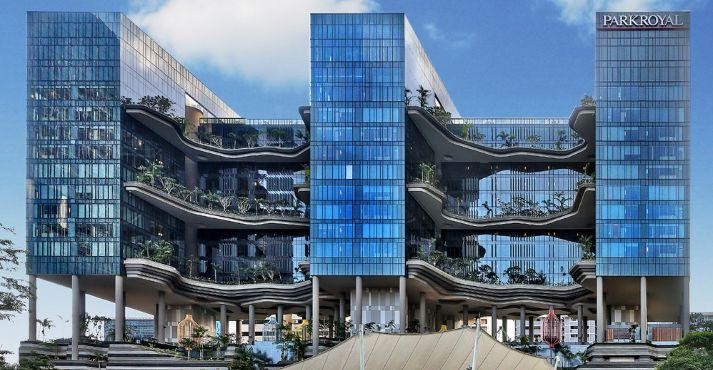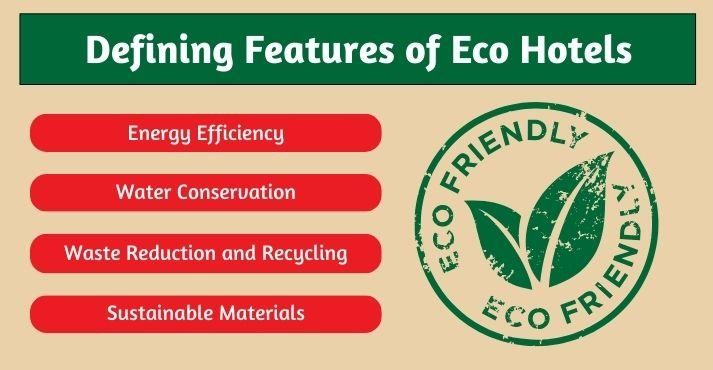Are you looking for accommodations that minimize their impact on the planet? With the rise of sustainable tourism, more travelers opt for eco-friendly hotels that respect the environment while providing a comfortable stay.
These eco-conscious hotels, often called eco hotels or green hotels, prioritize environmental responsibility by integrating sustainable practices into their operations.
Staying at an eco-certified hotel can benefit the environment and local communities. Many hotels use energy-saving solutions, recycle materials, conserve water, and support local economies through sustainable sourcing.
Choosing to stay in an eco-hotel allows guests to reduce their carbon footprint while experiencing an eco-friendly approach to hospitality.
In this article, we’ll explore what makes a hotel truly “eco,” the features that define these environmentally friendly hotels, and real-life examples from Southeast Asia.
What is an Eco Hotel?

PARKROYAL on Pickering, Singapore
An eco hotel is an accommodation designed to minimize environmental impact through sustainable practices. These hotels, also known as green or eco-friendly hotels, prioritize environmentally responsible initiatives in every part of their operations.
From reducing energy use to reducing waste, eco hotels adopt innovative ways to lessen their footprint.
Eco hotels focus on energy efficiency, water conservation, waste reduction, and sustainable materials. They are often powered by renewable energy sources, such as solar panels, and fitted with energy-efficient lighting and appliances.
Many also employ eco-friendly amenities and avoid single-use plastics, choosing reusable or compostable alternatives.
To qualify as an eco-certified hotel, these establishments must adhere to recognized environmental standards, which often include certifications from recognized agencies.
These certifications ensure an eco-hotel meets rigorous criteria for sustainable practices, helping guests identify hotels committed to environmental stewardship.
Key Features of Eco Hotels

Eco hotels set themselves apart by incorporating sustainability into every layer of their operations. Here are some of the core features that define these environmentally conscious accommodations:
1. Energy Efficiency
One of the most noticeable features of eco hotels is their focus on energy efficiency. These hotels often integrate renewable energy sources, like solar panels and wind turbines, to power their facilities. They also use energy-efficient appliances, lighting, and heating systems.
Eco hotels often install smart thermostats and automated systems to regulate energy use, ensuring that rooms are only heated or cooled when necessary. Such measures significantly reduce their carbon footprint and contribute to a greener hospitality sector.
2. Water Conservation
Eco hotels take steps to conserve water through the use of low-flow faucets, dual-flush toilets, and rainwater harvesting systems. In regions with water scarcity, these practices make a meaningful difference.
For instance, Six Senses Con Dao in Vietnam has implemented advanced water-saving technologies, including a rainwater collection system that supplies the resort with usable water.
These water conservation efforts not only reduce the demand for freshwater but also raise guests’ awareness of the importance of preserving this valuable resource.
3. Waste Reduction and Recycling
Minimizing waste is a core objective of eco hotels, and they achieve this through strict recycling programs, composting organic waste, and reducing single-use plastics.
Some hotels go further by eliminating plastic from their premises, opting for alternatives like bamboo toothbrushes, glass water bottles, and compostable packaging.
Marina Bay Sands in Singapore has an extensive recycling initiative aimed at diverting waste from landfills and encouraging guests to participate in eco-conscious behaviors.
By making waste reduction a priority, eco hotels set an example of responsible consumption and waste management.
4. Sustainable Materials
Eco-hotels often incorporate sustainable materials in their design and furnishings. Many use locally sourced, renewable materials like bamboo, reclaimed wood, and recycled metals to build and decorate their spaces.
An example can be seen at Keemala in Thailand, where the architecture blends into the natural landscape, using sustainable and locally available materials.
The emphasis on eco-friendly materials reduces environmental impact and boosts the hotel’s aesthetic and authenticity, offering guests a unique, nature-oriented experience.
4. Local Sourcing
A commitment to local sourcing is a defining trait of eco-hotels. By choosing locally produced food, products, and services, eco-hotels reduce their carbon footprint and support the local economy.
For instance, Potato Head in Bali partners with local farms to supply organic produce to its restaurants, promoting sustainable agriculture while providing fresh, healthy food to guests.
This practice minimizes transportation emissions and contributes to the economic well-being of surrounding communities.
Strategies for Implementing Eco-Friendly Practices

Transitioning a traditional hotel into an eco-friendly establishment involves strategic and thoughtful changes that benefit both the environment and the guest experience.
Eco hotels adopt sustainable practices that minimize their environmental footprint, using methods that are both effective and feasible.
Here are some essential strategies for implementing sustainable practices in an eco-hotel:
1. Energy Solutions
Energy efficiency is fundamental to the operations of eco-friendly hotels. By using energy-saving technologies, eco-hotels reduce their carbon footprint and set a new standard for environmental responsibility.
Popular energy solutions include installing solar panels, using LED lighting, and deploying automated systems to control energy use based on occupancy.
- Solar Power: Solar panels are a long-term investment that significantly reduces dependence on fossil fuels. This approach lowers utility costs and creates a cleaner, more autonomous energy source.
- LED Lighting: LED lights consume up to 80% less energy than traditional incandescent bulbs and last significantly longer. When replacing conventional lighting with LEDs, eco hotels cut down on energy usage while creating a warm ambiance. Hotels can install dimmable LEDs in guest rooms and public areas to adjust light intensity as needed, saving energy when full lighting isn’t necessary.
- Smart Thermostats and Automated Systems: Many eco hotels use smart thermostats and occupancy sensors to manage room temperatures, lighting, and other energy demands. These automated systems adjust settings based on occupancy, saving energy when rooms are unoccupied.
2. Water Management Systems
Water conservation is another critical focus for eco-hotels, particularly in water scarcity areas. By implementing advanced water management systems, these hotels save water and raise awareness among guests and staff about responsible usage.
- Low-Flow Fixtures: Installing low-flow faucets, showerheads, and dual-flush toilets in guest rooms and public restrooms helps reduce water consumption without compromising comfort. Low-flow fixtures can cut water usage by up to 30%, substantially impacting the hotel’s overall water demand.
- Rainwater Harvesting: Rainwater harvesting systems collect and store rainwater for landscaping, irrigation, and other non-potable needs. For example, PARKROYAL on Pickering in Singapore has implemented a rainwater capture system that irrigates its lush green walls and gardens. This creative approach conserves water and contributes to the hotel’s stunning biophilic design, improving the guest experience while promoting sustainable water use.
- Water Recycling and Filtration Systems: Besides harvesting rainwater, some eco hotels use greywater recycling systems that purify and reuse water for non-potable purposes, such as irrigation and flushing toilets. These systems reduce dependence on municipal water supplies, making them especially valuable in regions with limited water access.
3. Sustainable Sourcing
Sustainable sourcing is a key component of eco-hotel practices. It involves using local, organic, and ethically produced goods to support environmentally friendly supply chains.
Eco hotels build relationships with nearby farmers, artisans, and suppliers to ensure their products align with sustainability standards. This practice reduces the environmental impact of transportation, supports local economies, and offers guests an authentic experience rooted in local culture.
- Local and Organic Ingredients: When sourcing food sustainably and locally, eco hotels minimize transportation emissions and provide guests with fresh, seasonal meals. This partnership supports sustainable agriculture and delivers high-quality meals to guests, reflecting the hotel’s commitment to environmental and social responsibility.
- Ethical and Fair-Trade Products: Eco hotels often prioritize fair-trade and ethically produced goods, including coffee, tea, and bath amenities. By choosing fair-trade items, hotels contribute to responsible labor practices and support communities globally. Some hotels also opt for eco-friendly toiletries made from natural ingredients, which reduce the use of chemicals and plastic packaging.
- Supporting Local Artisans: Eco hotels that decorate with locally crafted furnishings showcase regional culture, support local artisans and reduce the carbon footprint associated with shipping imported goods. These efforts provide guests with a unique, culturally rich experience while promoting sustainable commerce.
How to Transition a Traditional Hotel into an Eco Hotel
Transitioning a hotel to an eco-friendly model requires a blend of small, sustainable changes and long-term investments in environmental responsibility.
This transformation reduces the hotel’s environmental impact and appeals to the growing number of eco-conscious travelers. Here’s a roadmap that breaks down actionable steps for turning a traditional hotel into a sustainable eco-hotel.
Step-by-Step Guide: Building a Sustainable Foundation
Making the shift to a green hotel model can be manageable. The journey begins with manageable adjustments and can evolve over time as the hotel commits to more significant sustainability projects.
Below are steps that hotels can follow to transition into an eco-friendly hotel gradually:
1. Implement Recycling Programs and Reduce Waste
- Start with Recycling: Set up recycling stations in common areas, guest rooms, and staff facilities to encourage waste separation.
- Minimize Single-Use Plastics: Replace plastic amenities with reusable or biodegradable alternatives, such as bamboo toothbrushes, refillable soap dispensers, and cloth laundry bags.
- Composting Organic Waste: Introduce a composting program for kitchen and restaurant waste to reduce the amount of waste sent to landfills and repurpose it as fertilizer for the hotel’s landscaping needs.
2. Switch to Energy-Efficient Lighting and Appliances
- LED Lighting: LED lights consume significantly less energy and last longer than traditional incandescent bulbs. To save even more energy, consider installing dimmable lights in guest rooms and public areas.
- Energy-Efficient Appliances: Upgrade kitchen, laundry, and HVAC appliances to energy-efficient models certified by programs such as ENERGY STAR. These appliances use less electricity and water, reducing operational costs and environmental impact.
3. Install Water-Saving Fixtures
- Low-Flow Fixtures: To conserve water in guest rooms and public restrooms, incorporate low-flow showerheads, faucets, and dual-flush toilets.
- Rainwater Harvesting: Capture and store rainwater for landscape irrigation and other non-potable uses. This strategy is especially effective in regions with seasonal rainfall, as it reduces the demand for municipal water.
- Water Monitoring Systems: Invest in intelligent water monitoring systems that detect leaks and optimize water usage across the hotel.
4. Optimize Heating and Cooling Systems
- Smart Thermostats: Install thermostats that adjust room temperatures based on occupancy, saving energy when rooms are vacant.
- Green HVAC Systems: Gradually replace older heating, ventilation, and air conditioning systems with energy-efficient, eco-friendly options. Look for HVAC systems that utilize natural refrigerants with a lower environmental impact.
- Insulation and Sealing: Improve insulation in guest rooms, doors, and windows to reduce energy loss and help maintain consistent indoor temperatures.
5. Progress to Advanced Sustainability Projects
- Solar Panels and Renewable Energy: Installing solar panels or connecting to a renewable energy grid can greatly reduce dependence on fossil fuels. This investment pays off by lowering electricity costs and showcasing the hotel’s commitment to sustainable energy.
- Biophilic Design Elements: Incorporate plants, green walls, and natural materials in the hotel’s design to improve air quality, reduce guests’ stress, and create a connection to nature. Biophilic designs are increasingly popular as they boost the guest experience while aligning with eco-friendly values.
6. Engage and Educate Staff and Guests
- Staff Training: Educate employees on eco-friendly practices and encourage them to reduce waste, conserve resources, and support sustainability initiatives.
- Guest Awareness Programs: Place signage or digital displays in rooms and common areas to inform guests about the hotel’s sustainable practices. Offering options like a linen reuse program or energy-saving recommendations allows guests to participate actively in reducing the hotel’s environmental footprint.
Achieving Eco Certifications and Standards
Certifications serve as valuable proof of a hotel’s dedication to sustainability. When earning eco certifications, hotels can differentiate themselves in the market, earn the trust of eco-conscious travelers, and stay accountable to high environmental standards.
Here’s an overview of some of the most reputable eco certifications in the hospitality industry:
1. LEED (Leadership in Energy and Environmental Design)
LEED certification is one of the most recognized green building standards worldwide. Managed by the U.S. Green Building Council, LEED evaluates various aspects of a building’s sustainability, including energy use, water efficiency, waste management, and indoor air quality.
- LEED Levels: Hotels can earn different levels of LEED certification—Certified, Silver, Gold, and Platinum—based on their performance in sustainability metrics. Each level represents a greater degree of environmental commitment.
2.EarthCheck Certification
EarthCheck is a global certification system specifically designed for the travel and tourism industry. It helps hotels measure and manage their environmental footprint in categories such as energy, water, waste, and community involvement.
- Benefits of EarthCheck: EarthCheck certification demonstrates that a hotel is actively working to minimize its environmental impact. It’s a respected mark of eco-responsibility in Asia-Pacific, with numerous Southeast Asian hotels achieving this certification to appeal to green travelers.
3. Green Key Certification
Green Key is an international certification awarded to hotels that excel in sustainability management, guest education, and community involvement. This program, which originated in Denmark, assesses a hotel’s eco-friendly initiatives and provides tools for ongoing improvement.
- Community Engagement: Green Key encourages hotels to support local environmental projects and educate guests about sustainable practices, adopting a well-rounded approach to sustainability.
4. BCA Green Mark (Singapore)
BCA Green Mark is a certification tailored for buildings, structures, and different hotel types in Singapore. It focuses on energy efficiency, water conservation, and environmental protection.
Hotels certified under Green Mark demonstrate a commitment to green building practices, aligning with Singapore’s national environmental goals.
- Local Relevance: Hotels in Singapore that achieve the BCA Green Mark certification contribute to the country’s sustainability efforts and gain credibility as environmentally responsible businesses.
Conclusion
Eco hotels are more than just a trend; they represent a shift in the hospitality industry toward sustainable practices that benefit the environment and communities.
These environmentally friendly hotels prioritize ecotourism by focusing on energy conservation, waste reduction, and water-saving solutions. When staying in an eco-hotel, travelers can enjoy a unique, eco-conscious experience that aligns with their values.
Now that we know what eco-hotels are, we can safely state that they provide a sustainable choice for those who want to minimize their impact on the planet and ensure that guests enjoy a memorable stay.
Supporting and choosing these eco-friendly accommodations is a simple step toward supporting a greener, healthier world.















